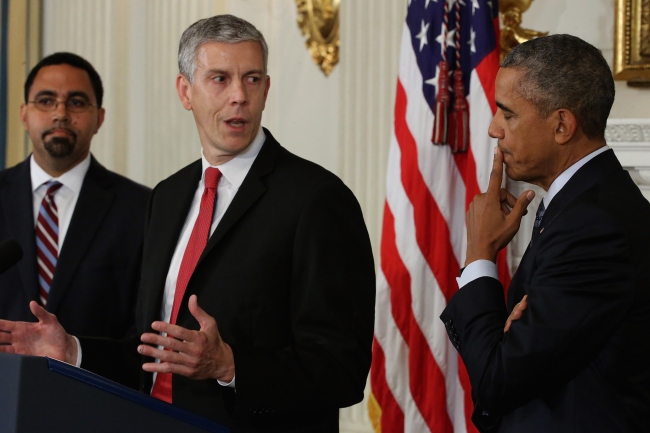You have /5 articles left.
Sign up for a free account or log in.

Arne Duncan thanks President Obama, with successor John King Jr. looking on.
Getty Images
Arne Duncan, a member of President Obama's inner circle and the second-longest-serving education secretary ever, announced Friday that he will resign in December. He will be replaced by John King Jr., who has been acting as Duncan's deputy secretary since January and is former commissioner of education in New York.
Many observers had assumed that Duncan would be among those to turn out the lights on the administration in early 2017, given his close personal relationship to the president; they are basketball-playing buddies as well as close colleagues. And indeed, President Obama said in a news conference announcing Duncan's departure Friday that he had "pushed Arne to stay."
But while Duncan's announcement that he would not stay out the full two-term Obama presidency, as Education Secretary Richard W. Riley did with President Clinton from 1992-2001, seemed to take many people by surprise. Former aides to the secretary said they had suspected he would be leaving when they learned that his wife and children had moved back to Chicago at the start of this academic year. Duncan is widely known as a serious family man who built his schedule in part around time with his children and being home for family dinners.
Like every education secretary, much of the focus of Duncan's tenure has been on elementary and secondary education, and it is primarily that work for which he will probably be remembered (positively and negatively) by most Americans. Duncan's vocal support for the controversial Common Core standards effort made him a target of teachers' unions and states' rights advocates alike.
Yet like his immediate predecessor in the George W. Bush administration, Margaret Spellings -- but even more so -- Duncan has overseen an Education Department that has taken an activist role in higher education policy making: overhauling the student loan programs, aggressively cracking down on for-profit colleges and campus sexual assault, and turning up the accountability pressures on (and the regulation of) colleges.
He operated much more like a CEO -- encouraging underlings to pursue their goals (which critics said sometimes led the department astray) -- than as a micromanager enveloped in the intricacies of policy making.
Under Duncan, the tension continued and arguably intensified between the Education Department's dueling roles as a promoter of educational innovation (promoting competency-based education, for instance) and a guardian of federal funds and educational quality. Pursuing both of those often conflicting goals meant that he sometimes alienated supporters (like consumer groups at the higher ed level and teachers' unions in K-12) who much of the time stood by his side.
A Steep Learning Curve
As has been true of previous education secretaries, Duncan came into his job with limited experience with and knowledge about higher education. He had headed the Chicago Public Schools, where he was praised as a fierce advocate for low-income students but clashed with teachers over his support for charter schools and testing, among other things.
Duncan and Obama came into office after the 2008 election at a time when Spellings and Bush had alienated many leaders in higher education with plentiful rhetoric about higher education's failings and an aggressive push to hold colleges more accountable for measuring the learning outcomes of their students. Many people on campuses were hopeful that the incoming Democratic administration would provide more financial support for students and ease up on the accountability push.
They largely got the former, but were sorely disappointed on the latter, as the administration both made higher education an investment priority and pushed hard on holding colleges accountable.
In the administration's first year, President Obama and Duncan made higher education a priority in the stimulus funding they backed to keep the economy's gears turning during the recession, pouring tens of billions of dollars into scientific research and helping states offset potential cuts to colleges and schools.
The administration also pushed through a generally popular plan (except with lenders) to eliminate the Federal Family Education Loan Program and instead make the federal government the sole originator of federal student loans through the Education Department's Direct Loan Program. The architect of that plan was Robert Shireman, who advised President Obama during the transition and was formally appointed as the senior political member of Duncan's team a few months into the administration's term.
Shireman and some longtime career employees at the department, including David Bergeron and Daniel Madzelan, got wide berth from Duncan to help craft higher education policy, and out of the gate they attacked some longstanding issues that had troubled financial aid experts and consumer groups for years. The restructuring of the student loan programs largely ended years of fighting over that issue and freed up huge sums of money that the new administration poured into restoring some of the buying power of the Pell Grant program for needy students, which had stagnated and lost ground over the previous decade. The doubling of spending on Pell Grants is clearly one of the hallmarks of Obama's and Duncan's tenure.
The other major thrust of the early part of the Obama/Duncan tenure was ratcheting up regulation of for-profit higher education, which over the previous decade (thanks in large part to a loosening of oversight by the Bush administration) had seen its share of postsecondary enrollments and Pell Grant funds soar along with the industry's profits and students' debt levels. Little about Duncan's history would have prompted predictions that he would immediately target for-profit higher education as education secretary -- public school advocates viewed his tenure in Chicago as championing corporatization and charter schools.
But one of the strengths of Duncan's "very inclusive" style of leadership, says Ben Miller, who worked in the Education Department from 2011 to 2013 and is now an analyst at the Center for American Progress, is that he encouraged individual offices and aides to step forward, "creating room for people who have ideas." (He and others note that Duncan always retained "veto power over major and midlevel policy decisions," as Education Reform Now's Michael Dannenberg, another former department aide, put it, and took ultimate responsibility for those decisions.)
Duncan largely unleashed Shireman and others to utilize an opening in federal higher education law to create the "gainful employment" standard that required for-profit colleges and vocational programs at community colleges to prove they were preparing graduates for the workplace. (The same latitude can be seen in the administration's forceful emphasis on ferreting out sexual assault on college campuses, which grew from a fresh reading by the agency's Office for Civil Rights of Title IX of the Education Amendments of 1972, which bars sex discrimination by educational institutions.)
Aiming High, Falling Short
The Education Department's aggressive pursuit of for-profit colleges was clearly another of the Obama administration's defining education initiatives -- and it reflects both the strengths and weaknesses of Duncan's tenure there, many analysts say.
The department's initial pass at creating new gainful employment rules was struck down by a federal court, which ruled that while the department had the authority to regulate in that way, it had not done its homework in crafting the measure it used. (The administration has also faced legal challenges on other "program integrity" rules related to the credit hour and state authorization of postsecondary programs.)
In that and other ways, the administration won points for aggressiveness and creativity but fell short in its ability to implement its proposals. While relatively few people have objected philosophically to the shift to 100 percent direct lending, and the lending itself has gone pretty smoothly, Duncan's department has taken its lumps from financial aid officers and consumer advocates who say it has failed to provide sufficient support to borrowers. The government is ill-equipped to be a trillion-dollar lender, some critics say.
Perhaps the administration's biggest higher education misstep was its proposal to produce a system to rate colleges based on their performance on a variety of outcome measures, which the Education Department largely abandoned last summer after concluding -- months after most other observers had -- that doing so was folly.
The ratings debacle cannot be laid at Duncan's feet -- by all accounts it was a White House-driven initiative pushed first and foremost from the Oval Office itself. But for many in higher education, it was a rare example of the administration acknowledging that it had gone too far in its efforts to regulate higher education.
"Secretary Duncan, like all his predecessors, was mostly focused on elementary and secondary education, but unlike most of his predecessors, he significantly expanded the federal role in higher education," said Terry W. Hartle, senior vice president for government and public affairs at the American Council on Education. Unlike Spellings, who put intense pressure on colleges on student learning outcomes, Duncan's Education Department engaged in an "across-the-board sweep, increasing federal oversight in multiple dimensions," Hartle said.
Hartle conceded a point made by many of those who have cheered increased federal regulation -- that the administration has ratcheted up its oversight in exchange for the increased funding it has poured into its push to send more people to college.
"What I think will be the lasting conceptual legacy of Arne Duncan's tenure is an extension of the higher education policy paradigm from just basically supporting college access and affordability, to also including college completion and quality," said Dannenberg, the former Education Department (and U.S. Senate) aide. "In pursuit of that, the Obama administration has paid attention to areas that have not hitherto been regulated, and appropriately so."
If Duncan has largely followed the lead of the higher education experts in his department (like Shireman and Martha Kanter and Ted Mitchell, who have served as his under secretaries of education), he showed an increasing understanding of and passion about some of those issues as his tenure progressed, says Zakiya Smith, another former department aide who now works at the Lumina Foundation.
"Particularly as higher ed issues became more and more prominent in the administration, he has shown more personal interest and engagement," said Smith.
When the department took its second bite at the apple after a court invalidated the first iteration of gainful employment, she noted, Duncan became a much more visible and vocal champion of the new rules.
And a July speech by Duncan, which was heavy on warnings about college accountability, was probably the most expansive and detailed higher ed policy address of his six years in the job.
Inside Higher Ed's headline for that article was "Obama's Higher Ed Home Stretch," but in retrospect, it was also very clearly Duncan's.









